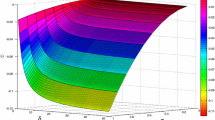Abstract
In many market environments, for example in investment banking, salesforce management and others, workers and supervisors work closely as a team. Workers are paid a fixed salary and supervisors determine any raises, which are typically dependent on how well the organization does. In such scenarios, a supervisor who constantly offers suggestions can create a problem—typically a worker cannot ignore his supervisor’s advice, yet if such advice is wrong and is followed, it will only decrease firm profits. We conduct a laboratory experiment to address a question critical for such settings—does the relationship between advisor and worker interfere with the learning abilities of the worker? The answer is a resounding no. In fact, subjects who have a supervisor advising them and whose advice is costly to ignore actually learn better than those with an advisor whose advice can be ignored. An even more striking result is that advisees as well as advisors in both these conditions learn better than subjects with no advisors. Our result can be attributed to the presence of advice and has direct relevance to learning in many environments.
Similar content being viewed by others
References
Athey, S., Avery, C., & Zemsky, P. (2000). Mentoring and diversity. The American Economic Review, 90, 765–786.
Bornstein, G., & Gneezy, U. (2002). Price competition between teams. Experimental Economics, 5, 29–38.
Bornstein, G., & Yaniv, I. (1998). Individual and group behavior in the ultimatum game: are groups more “rational” players?. Experimental Economics, 1, 101–108.
Bull, C., Schotter, A., & Weigelt, K. (1987). Tournament and piece rates: an experimental study. Journal of Political Economy, 95, 1–33.
Chi, M., Bassok, M., Lewis, M., Reimann, P., & Glaser, R. (1989). Self-explanations: how students study and use examples in learning to solve problems. Cognitive Science, 15, 145–182.
Cooper, D. J., & Kagel, J. H. (2005). Are two heads better than one? Team versus individual play in signaling games. American Economic Review, 95(3), 477–509.
Cox, J. C., & Hayne, S. C. (2006). Barking up the right tree: are small groups rational agents?. Experimental Economics, 9(3), 209–222.
Duarte, N. T., Goodson, J. R., & Klich, N. R. (1993). How do i like thee? Let me appraise the ways. Journal of Organizational Behavior, 14, 239–249.
Duarte, N. T., Goodson, J. R., & Klich, N. R. (1994). Effects of dyadic quality and duration on performance appraisal. The Academy of Management Journal, 37, 499–521.
Eisenhardt, K. (1989). Agency theory: assessment and review. Academy of Management Review, 14, 57–74.
Ferguson-Hessler, M., & de Jong, T. (1990). Studying physics texts: differences in study processes between good and poor solvers. Cognition and Instruction, 7, 41–54.
John, G., & Weitz, B. (1989). Salesforce compensation: an empirical investigation of factors related to use of salary versus incentive compensation. Journal of Marketing Research, 16, 1–14.
Jaworksi, B. J., & Kohli, A. K. (1991). Supervisory feedback: alternative types and their impact on salesperson’s performance and satisfaction. Journal of Marketing Research, 28, 190–201.
Kocher, M., & Sutter, M. (2005). The decision maker matters. Individual versus team behavior in experimental beauty-contest games. Economic Journal, 115, 200–223.
Kohli, A. K., Shervani, T. A., & Challagalla, G. N. (1998). Learning and performance orientation of salespeople: the role of supervisors. Journal of Marketing Research, 35, 263–274.
Krishna, V., & Morgan, J. (2001). A model of expertise. Quarterly Journal of Economics, 116, 747–775.
Lerner, J. S., & Tetlock, P. E. (1994). Accountability and social cognition. In V. S. Ramachandran (Ed.), Encyclopedia of human behavior (Vol. 1, pp. 3098–3121).
Lerner, J. S., & Tetlock, P. E. (1999). Accounting for the effects of accountability. Psychological Bulletin, 125(2), 255–275.
Lounamaa, P. H., & March, J. G. (1987). Adaptive coordination of a learning team. Management Science, 33, 107–123.
Merlo, A., & Schotter, A. (1999). A surprise-quiz view of learning in economic experiments. Games and Economic Behavior, 28, 25–54.
Merlo, A., & Schotter, A. (2003). Learning by not doing: an experimental investigation of observational learning. Games and Economic Behavior, 42, 116–136.
Nagel, R. (1995). Experimental results on interactive competitive guessing. American Economic Review, 85, 1313–1326.
Newey, W. K., & West, K. D. (1987). A simple, positive semi-definite, heteroskedasticity and autocorrelation consistent covariance matrix. Econometrica, 55, 703–708.
Oliver, R. L., & Anderson, E. (1994). An empirical test of the consequences of behavior and outcome-based sales control systems. Journal of Marketing, 58, 53–67.
Ottaviani, M., & Sorensen, P. N. (2003). Professional advice: the theory of reputational cheap talk. Working paper.
Perrow, C. (1986). Complex organizations. New York: Random House.
Prendergast, C. (1993). A Theory of ‘yes men’. American Economic Review, 757–770.
Pressley, M., Wood, E., Woloshyn, V., Martin, V., King, A., & Menke, D. (1992). Encouraging mindful use of prior knowledge: attempting to construct explanatory answers facilitates learning. Educational Psychologist, 27, 91–109.
Radner, R., & Marschak, J. (1972). Economic theory of teams. New Haven: Cowles Foundation and Yale University Press.
Schotter, A., & Weigelt, K. (1992). Asymmetric tournaments, equal opportunity laws and affirmative action: some experimental results. Quarterly Journal of Economics, 108, 511–539.
Sujan, H., Weitz, B. A., & Kumar, N. (1994). Learning orientation, working smart and effective selling. Journal of Marketing, 58, 39–52.
Tetlock, P. E. (1983). Accountability and complexity of thought. Journal of Personality and Social Psychology, 45, 74–83.
Weber, R. (2003). Learning with no feedback in a competitive guessing game. Games and Economic Behavior, 44, 134–144.
Author information
Authors and Affiliations
Corresponding author
Electronic Supplementary Material
Rights and permissions
About this article
Cite this article
Iyengar, R., Schotter, A. Learning under supervision: an experimental study. Exp Econ 11, 154–173 (2008). https://doi.org/10.1007/s10683-007-9164-2
Received:
Revised:
Accepted:
Published:
Issue Date:
DOI: https://doi.org/10.1007/s10683-007-9164-2




